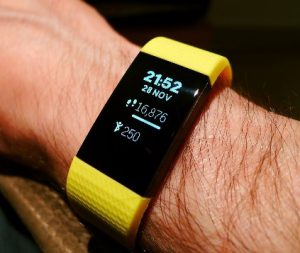by: Alicia Sandlin
In today’s age, everyone owns some sort of wearable technology or has one or two apps for fitness on their phones. The success of wearable health devices has sky rocketed in these last couple of year. It is now the number one fitness trend of 2017 (Thompson 2016). This can be shown as a testament to the public’s appetite for self-improvement. People want to strive to be healthier, fit, strong, and more active but does it really contribute to their daily activity?
There have been several studies on the effects of wearable technology and how it affects our actual behavior. One study performed in London, had a joint goal and leaderboard-based participation challenge that the participants did daily to see if the changes to their activity behavior at work and throughout their day. The results were that the challenges and technology lead to activity behavior changes both during the challenge period and for six months following the last challenge (Carter 2016).
Types of Wearable Technology for Exercise
There are several devices that are the most popular and affordable that go on your wrist such as the Fitbit, Apple Watch, Garmin, Android Watch, and other pedometers that are mass produced. The wearable technology is slowly becoming more affordable and easier to use.
For the more extreme athlete that are able to afford top notch technology there are wearable activity trackers such as smart shoes, HR detectable Bluetooth headphones, and even activity tracking compression shorts.
8 of the Top apps that can benefit daily health and physical activity
- Couch to 5K
- My Fitness Pal
- ActiveX
- Sworkit
- Charity Miles
- PEAR Personal Coach
- Strava
- LoseIt
All of these apps can be found on any smartphone app store. If someone is truly interested in getting healthy but does not know where to start, this may be an easy and cheap way to begin a start to a healthier life.
Thompson, W. R. (2016). Worldwide survey of fitness trends for 2017. ACSM’s Health & Fitness Journal, 20(6). 8-17. DOI: 10.1249/FIT.0000000000000252
Carter, R. (2016). The application of behaviour change theory, delivered through mobile-app and wearable-based technology, proven to engage and improve the health & wellbeing of populations. Digital Health and Wellbeing. DOI: 10.3389/conf.FPUBH.2016.01.00030


